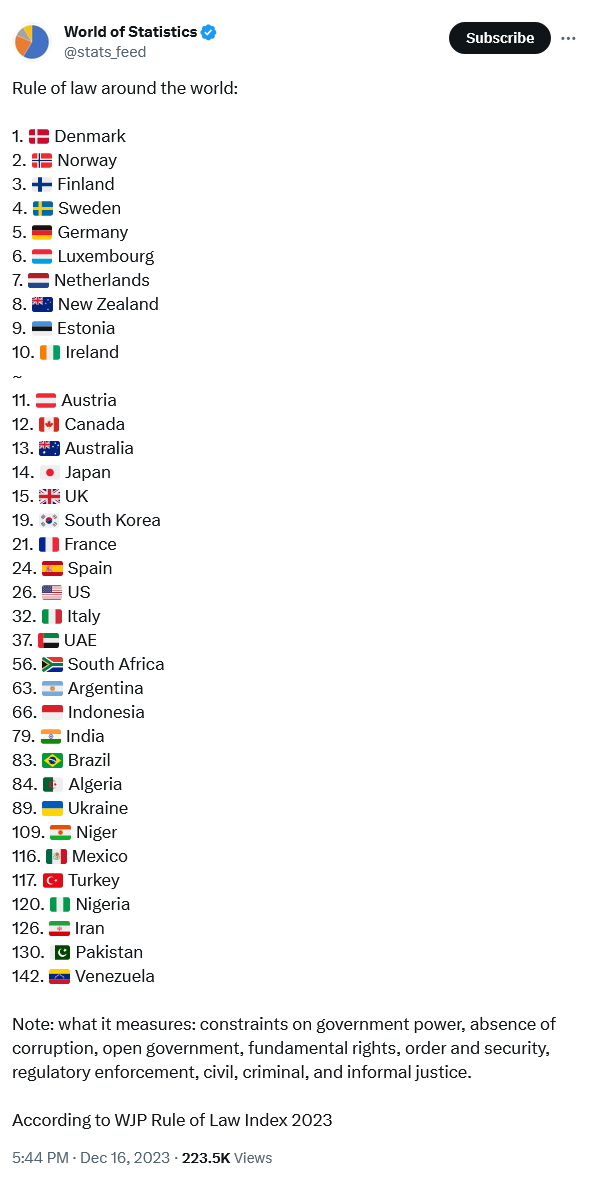 Pakistan's inflation rate, based on April 2024 data from the Pakistan Bureau of Statistics. Image via Wikipedia (Public Domain).[/caption]
In November 2024, Pakistan implemented stricter measures to prevent the misuse of visas for the Umrah pilgrimage to Mecca, Saudi Arabia. Earlier in September, Saudi authorities alleged that Pakistani beggars were entering the country under the guise of religious pilgrimages and urged Islamabad to address the issue.
Under the new regulations, pilgrims must sign an affidavit pledging not to beg during their stay in Saudi Arabia. Those found violating this agreement will face legal consequences upon their return to Pakistan. Also, only group travel for Umrah is permitted, and a blacklist is being created to track violators. Tour operators are now responsible for collecting these affidavits from pilgrims.
Religious pilgrimages such as Hajj and Umrah hold immense significance in Islam, a faith practiced by over 97 percent of Pakistan's population. In 2024, over 179,000 Pakistanis were among the millions of Muslims worldwide who traveled to Saudi Arabia for these sacred journeys. Hajj, one of the five pillars of Islam, is obligatory for those who can afford it, while Umrah is a voluntary but highly revered act of worship.
Pakistan's inflation rate, based on April 2024 data from the Pakistan Bureau of Statistics. Image via Wikipedia (Public Domain).[/caption]
In November 2024, Pakistan implemented stricter measures to prevent the misuse of visas for the Umrah pilgrimage to Mecca, Saudi Arabia. Earlier in September, Saudi authorities alleged that Pakistani beggars were entering the country under the guise of religious pilgrimages and urged Islamabad to address the issue.
Under the new regulations, pilgrims must sign an affidavit pledging not to beg during their stay in Saudi Arabia. Those found violating this agreement will face legal consequences upon their return to Pakistan. Also, only group travel for Umrah is permitted, and a blacklist is being created to track violators. Tour operators are now responsible for collecting these affidavits from pilgrims.
Religious pilgrimages such as Hajj and Umrah hold immense significance in Islam, a faith practiced by over 97 percent of Pakistan's population. In 2024, over 179,000 Pakistanis were among the millions of Muslims worldwide who traveled to Saudi Arabia for these sacred journeys. Hajj, one of the five pillars of Islam, is obligatory for those who can afford it, while Umrah is a voluntary but highly revered act of worship.
Reputation at stake
Reports suggest that these measures aim to protect Pakistan’s reputation abroad. But they raise significant concerns about the underlying socio-economic challenges within the country, such as poverty, unemployment, high inflation, and rising energy costs. The issue is not solely the actions of a few individuals but the broader socio-economic conditions that compel people to take desperate measures. While steps like the Umrah visa affidavit target specific behaviors, they fail to address the root causes — poverty, unemployment, and inequality — that drive individuals to misuse pilgrimage visas in the first place. One major concern with this punitive strategy is the inconsistency in accountability. While ordinary citizens face strict scrutiny and harsh penalties, Pakistan's political and economic elite often remain shielded from similar oversight. A report by the European Foundation for South Asian Studies highlights the entrenched corruption in Pakistan’s political sphere, where those in power frequently evade meaningful consequences despite serious allegations. Desperation in Pakistan is largely driven by a growing wealth gap between the rich and the poor. This inequality is exacerbated by widespread corruption, poor governance, and exploitation by the nation’s elite, including politicians, military leaders, and business tycoons. Reports by Transparency International reveal that corruption is endemic at all levels of government, with the elite leveraging their power to amass and protect wealth, while the majority of the population struggles to meet basic needs.Crackdown on alleged beggars
In November 2024, Pakistan informed Saudi Arabia about its measures to crack down on beggars misusing Umrah visas. These steps included requiring affidavits and placing 4,300 beggars on the Exit Control List (ECL), barring them from traveling abroad. Public opinion in Pakistan is divided on this issue. While some social media users praised the efforts, stating that they help deter pilgrimage visa abuse, others remain critical of the approach. As popular platform X (formerly Twitter) remains banned in Pakistan, opinions can be seen on platforms such as YouTube and LinkedIn. IT entrepreneur Arsalan K. wrote on LinkedIn:We have failed as a nation to keep our integrity and dignity intact. Though the economical crisis is the main reason people are taking such measures to go and beg in middle east countries as it’s comparatively easier to travel there but this begging hasn’t started recently. I personally have been experiencing this since over a decade. UAE, Qatar, KSA, Oman Its everywhere. Sorry to say but mostly these beggars are from central and upper Punjab province. Extreme measures are being taken due to such shameful acts. I am very ashamed usually when people from other countries point out such incidents and associate it with Pakistan. What a pathetic situation to be in being a Pakistani. Sigh!Pharmaceutical professional Abdul Basit commented on LinkedIn:
This is ridiculous, those who are intended to beg will continue to beg even after declaration, they just need to catch them those who are begging and punished them hardly for once.However, some argue that instead of blaming individuals, the focus should be on addressing the underlying socio-economic issues that drive people to beg. IT professional Maisam Haidar comments in LinkedIn:
There are some kind of gangs who bring baggers in Saudi and take commission from them and tell them to bag using different excuses. "I do not have any work and my father/brother/wife etc, passed away or serious or I have no money for a ticket bla bla bla". That's how the baggers business works. Capitalism. 😅On November 25, a ten-member group was arrested at Karachi Airport while attempting to travel to Saudi Arabia on Umrah visas. According to the Federal Investigation Agency (FIA), the group lacked hotel reservations and sufficient funds for their stay, raising suspicions of being trafficked for begging. Nasir jamal Durrani posts on Bluesky:
The Pakistan Interior Ministry stated that they have offloaded 44,000 passengers over various suspicions in the past few years.لوگ حج ، عمرہ سے واپس آئے لوگوں کی دعائیں لینے دور دور سے آتے ہیں اور یہ بدبخت ، یزید ایسا کر رہے ہیں ۔ This is how you will treated in Pakistan even you just arrived from umrah. #imrankhan #imrankhanPTI #PTI #PAKISTAN
[image or embed] — Nasir jamal Durrani (@nasirjamaldurrani.bsky.social) November 25, 2024 at 12:11 AM
Migration vs remittance
Many Pakistanis are compelled to seek better opportunities abroad due to the country’s ongoing economic crisis since 2022. As of April 2024, migration data show that over 13.5 million Pakistanis are working in more than 50 countries, with significant numbers in Saudi Arabia, the UAE, and the UK. In the past five years alone, over 3 million Pakistanis have migrated abroad, half of them classified as low-skilled or semi-skilled. While millions leave in pursuit of improved living conditions, they are simultaneously expected to support Pakistan’s economy through remittances. This creates a paradox: despite the country’s heavy reliance on remittances, the underlying issues driving migration remain largely unaddressed. The government’s reliance on remittances — 24 percent of which come from Saudi Arabia — and international aid highlights a significant systemic challenge. The citizens who would benefit most from these funds are often excluded from accessing them. Political elites frequently exploit these foreign resources to maintain their own interests, further deepening the country’s economic disparity. The Pakistani government is also seeking investment from its diaspora through various initiatives, such as the Roshan Digital Account (RDA), which attracts overseas Pakistanis to invest in the country. This initiative has brought in around USD 9 billion in remittances over the past four years, up to October 2024. Despite these efforts, the reality on the ground remains challenging for the investors. Pakistan continues to struggle to attract foreign investment, and even domestic investors are looking to diversify their assets abroad due to political and economic uncertainties. According to a report by the Atlantic Council published in February 2024, Pakistan's economic revival requires comprehensive reforms, including strengthening property rights, increasing public investment in education and health, improving state capacity, implementing fair taxation, protecting minority rights, and creating conditions that support women's economic participation. Without these systemic changes, efforts to reduce begging overseas only scratch the surface and overlook the larger issues.Showcase of Published Articles by Syed Salman Mehdi
Explore my body of work, featuring articles published in renowned platforms across the globe. Delve into a range of topics, including geopolitics, social issues, and more. Below is a comprehensive list of my published articles.
Green Left Weekly 🌍
Moral Betrayal of Gaza Published in 2024, this piece explores the moral implications of global indifference towards Gaza’s plight.
Paradigm Shift 🕊️
Geopolitical Chess: Analyzing the Global Power Play A 2024 article dissecting the intricate strategies of global powers.
Sugarcane Production in Pakistan: Challenges and Opportunities Examining the socio-economic impact of Pakistan’s sugarcane industry in 2024.
Global Voices 🌐
A Reactive Approach: Examining Pakistan Government’s Measures in Response to Alleged Umrah Visa Abuse Published on December 22, 2024, this article evaluates Pakistan’s reactive policies to visa-related controversies.
CounterPunch 📰
Switzerland’s Burqa Ban: A Crossroads of Freedom, Identity, and Social Cohesion Published on January 3, 2025, this article navigates the complex socio-political dimensions of Switzerland’s burqa ban.
HumSub (English) ✍️
The Lost Children of Sindh: A Growing Horror A harrowing account of child trafficking in Sindh, published in 2024.
Labour Laws & Social Security Systems: The Dilemma of Forgotten People Highlighting systemic challenges faced by workers in 2024.
HumSub (Urdu) 🇵🇰
سال 2024 : انسانیت کے زوال کی داستان Reflecting on humanity’s decline in 2024.
معاشی زوال بذریعہ موروثی کمال Analyzing economic decline through hereditary politics in 2024.
مشرق وسطی اور کردوں کا مستقبل Delving into the future of Kurds in the Middle East, published in 2024.
About the Author 🖋️
Syed Salman Mehdi is a freelance writer and researcher, dedicated to uncovering nuanced perspectives on global and regional issues. With a flair for storytelling and a commitment to truth, he has contributed to leading platforms such as Green Left Weekly, CounterPunch, Paradigm Shift, and HumSub. Salman is passionate about sparking meaningful conversations through his work.
For freelance or ghostwriting enquiries, feel free to get in touch or visit my latest blog for updates and insights!











